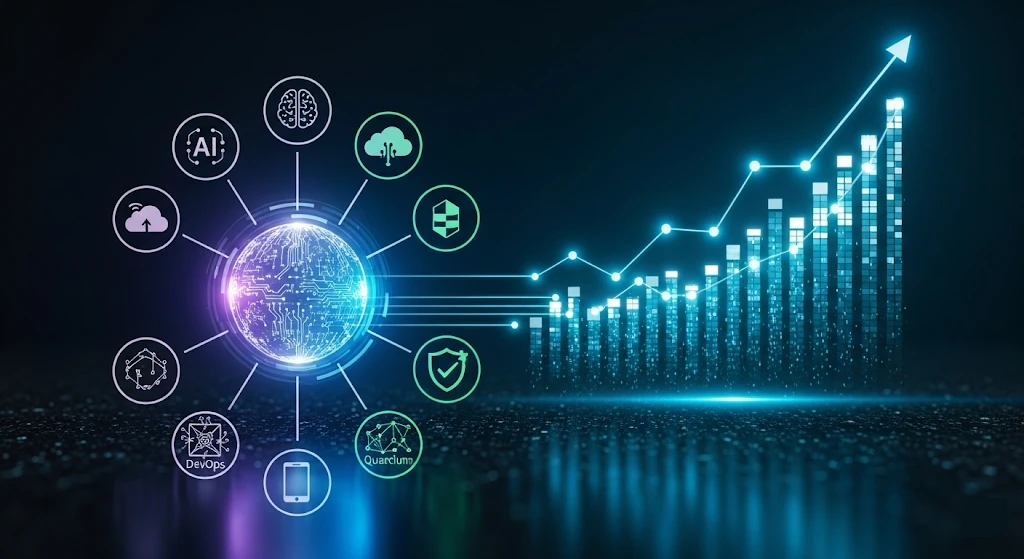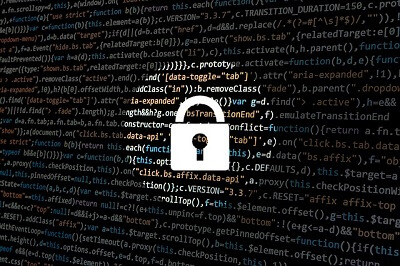Legendary basketball coach John Wooden summed it up best when he remarked “Failure itself is not fatal, but failure to change might be”. Businesses competing in today’s world need to take a closer look at the “Wizard of Westwood’s” philosophy. Whilst change remains the only constant, embracing strategic business challenges through implementing innovative software processes will lead to newfound opportunities and rewards.

2018 witnessed a rapid escalation in the advancement of technology, from machine learning and quantum computing to AR & VR, unceasing progress was the norm. As the dividing line between consumers and businesses became more hazy, both now equally reliant on a bewildering array of smart devices, superfast internet speeds and a cloud post code, it’s perhaps no surprise then that Software Developer is now the #1 best job in the US.
We have identified the top 5 emerging software development trends and technologies for 2019:
- Increase in Demand for Blockchain Developers
- Induction of Internet of Things (IoT)
- Advancement in Artificial Intelligence (AI)
- Evolution of Mixed Reality
- Escalation in Cybersecurity Threats
1. Increase in Demand for Blockchain Developers
A blockchain is a digitized and decentralized public ledger of all cryptocurrency transactions. It became popular with Bitcoin’s meteoric rise, and is expected to grow further in the future.
In fact, many organisations in different industries have started making their own apps using blockchain as an application platform.
You may want to start building your apps on blockchain’s platform too. A good place to start is What Is Blockchain And What Can Businesses Benefit From It? by Arthur Linuma, President and co-founder of a leading blockchain development agency in Los Angeles.
2. The Era of the Internet of Things (IoT)
Internet of Things (IoT) is a system of interconnected technological devices, humans and/or animals that is provided with unique IDs to facilitate interaction and exchange of data. Devices like Apple Watch, Fitbit, Driverless Cars and Heart Monitor Implants are some well-known examples of IoT incorporated technologies. This is the era to make a career in software development. There are also some steps for entering into software development that should be followed.
With the advent of this revolutionary technology, the need to store vast amounts of data has arisen. Organisations are using this technology internally to improve operational efficiencies and decision-making, hence increasing demand for technology skills aligned to big data.
3. Advancement in Artificial Intelligence (AI)
The future is predicted to revolve around artificial intelligence, whereby it will become a necessity for businesses to incorporate AI internally in their products. It is predicted that “IT and telecommunications (59%), business and professional services (43%) and customer services (32%) will be the three industries to be most positively impacted by AI.” (Forbes). There are also some other services in software development.
Google is a market leader in this technology. Though there are ethical issues that have arisen regarding this technology, Microsoft CEO Satya Nadella, not unsurpsingly sides in favour of AI:
“Artificial intelligence (AI) is the defining technology of our times…The future we will invent is a choice we make, not something that just happens.” (CNBC)
4. Evolution of Mixed Reality
Mixed Reality is a combination of real and virtual worlds, forming an environment that allows physical and digital objects to interact with each other simultaneously. While this concept may seem intriguing, it is challenging to execute it without glitches.
Mixed Reality can be implemented in a variety of sectors. Taking the education industry as an example, combining text book examples with real-world experiences is an innovative way of teaching students. Similarly, Mixed Reality in work environments where virtual elements are added to usual routines may potentially enhance the productivity of employees.
5. Escalation in Cybersecurity Threats

Cybersecurity has become one of the most critical issues facing the technology industry today. Customers have developed a strong mis-trust of companies’ handling of their personal data leading to widespread privacy concerns. As a result, companies have been forced to continually invest in stricter internal standards and controls.
Moreover, the EU Commission earlier this year introduced General Data Protection Regulation (GDPR) to standardise data protection laws throughout the 28 EU member states. It will remain in force in the UK even after Brexit has taken its course.
These are the reasons for software development outsourcing for businesses.
Conclusion
In a time of constant technological progress, where artificial intelligence and IoT are reducing the need for human intervention, increase in demand for a wide variety of software skills has risen exponentially. Software development also meets the users needs. From Blockchain developers to VR developers, companies are hiring specialists to help them embrace emerging and powerful transformative technologies. However, concerns around personal data have placed the privacy issue firmly on the map. With progress the growing need to use technology ethically has become a perceptible concern.
Read more: Free HVAC Scheduling Software: Streamlining Your Operations
